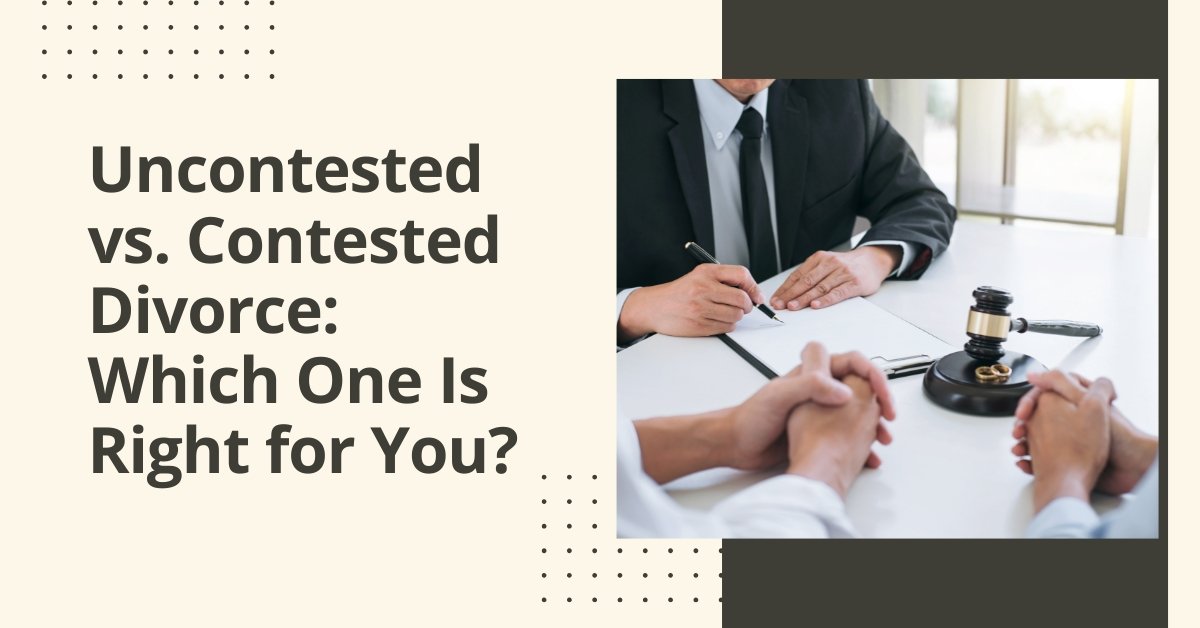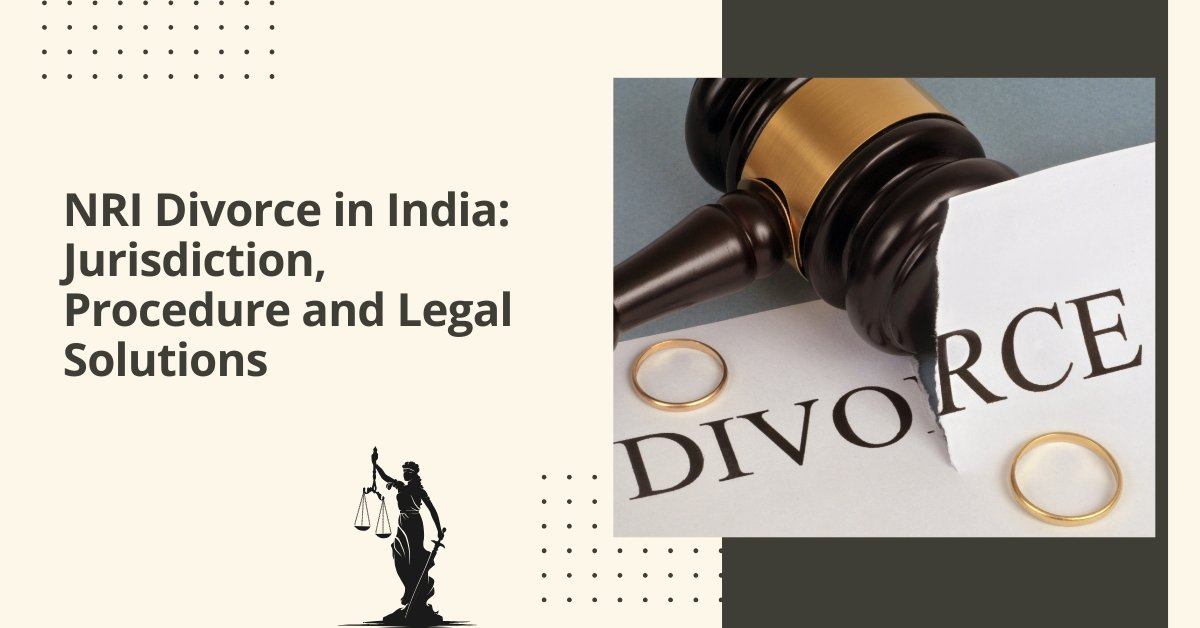Uncontested vs. Contested Divorce: Which One Is Right for You?

Divorce is a deeply personal and often emotionally charged process. For couples deciding to part ways, understanding the two primary types of divorce uncontested and contested is critical to navigating the legal, emotional, and financial complexities involved. Each type comes with its own set of advantages, challenges, and considerations, depending on the unique circumstances of the marriage.
In this blog, we’ll delve into the differences between uncontested and contested divorces, their processes, and how to determine which option is best suited for your situation.
What Is an Uncontested Divorce?
An uncontested divorce occurs when both spouses agree on all aspects of their separation without needing a judge to intervene in major decisions. This type of divorce is typically quicker, less expensive, and less adversarial.
Key Features of an Uncontested Divorce:
- Mutual Agreement: Both parties agree on major issues such as child custody, property division, alimony, and other financial considerations.
- Simplified Process: Since there is no dispute, the legal proceedings are straightforward, often involving filing forms and attending minimal court hearings.
- Lower Costs: Without lengthy court battles or extensive legal representation, the expenses are significantly reduced.
- Faster Resolution: Uncontested divorces can often be finalized in weeks or months, depending on local jurisdiction laws.
Pros of an Uncontested Divorce:
- Amicability: Helps preserve a cordial relationship between the spouses, which is especially important when children are involved.
- Cost-Effectiveness: Saves money on attorney fees, court costs, and mediation.
- Privacy: Details of the agreement remain largely private, as there’s less involvement of the court system.
- Control: Both parties retain more control over the terms of the divorce agreement rather than leaving decisions up to a judge.
Cons of an Uncontested Divorce:
- Not Ideal for Complex Cases: May not work if the marriage involves significant assets, debts, or complicated custody arrangements.
- Risk of Unfair Settlements: Without proper legal counsel, one spouse may end up with an agreement that doesn’t fully protect their interests.
What Is a Contested Divorce?
A contested divorce happens when spouses cannot agree on one or more critical aspects of their separation. These disagreements often require judicial intervention and can lead to lengthy and costly court proceedings.
Key Features of a Contested Divorce:
- Disagreements: Spouses dispute issues such as property division, child custody, alimony, or other legal matters.
- Lengthy Process: Requires multiple court hearings, legal motions, and possibly a trial.
- Higher Costs: Legal fees, court costs, and other expenses can quickly add up.
Pros of a Contested Divorce:
- Fair Resolution: Allows a judge to make impartial decisions when spouses cannot reach an agreement.
- Legal Protection: Ensures that each party has the opportunity to present their case and protect their rights.
- Thorough Examination: The court considers all relevant evidence, which can be helpful in complex cases.
Cons of a Contested Divorce:
- Time-Consuming: The process can take months or even years to resolve.
- Emotional Toll: The adversarial nature can exacerbate conflict and emotional distress.
- Financial Burden: Legal fees, court costs, and other associated expenses can be significant.
Key Differences Between Uncontested and Contested Divorce
Aspect | Uncontested Divorce | Contested Divorce |
Agreement | Spouses agree on all terms. | Spouses disagree on one or more terms. |
Time Frame | Typically quicker, taking weeks to months. | Longer, potentially lasting several months to years. |
Privacy | Proceedings are more private. | Details are often disclosed in court, making them public. |
Stress Level | Generally less stressful and more amicable. | Can be highly stressful due to prolonged disputes. |
How to Decide Which Divorce Is Right for You?
Choosing between an uncontested and contested divorce depends on your specific situation. Here are some factors to consider:
1. Level of Communication and Agreement
If you and your spouse can discuss and agree on major issues without conflict, an uncontested divorce may be the better choice. It allows for a smoother process and reduces emotional strain. However, if discussions often lead to disagreements, a contested divorce might be necessary.
2. Complexity of the Case
Uncontested divorces are best suited for simpler cases where there are no significant assets, debts, or custody disputes. For marriages involving complex financial arrangements or contentious custody battles, a contested divorce ensures all issues are thoroughly examined and resolved.
3. Emotional Readiness
An uncontested divorce requires cooperation and compromise, which may not be possible in high-conflict situations. If emotions are running high, a contested divorce may provide a structured environment for resolution.
4. Cost Considerations
Uncontested divorces are generally more affordable. If cost is a primary concern, this option might be preferable. However, if protecting your assets or ensuring a fair outcome outweighs financial considerations, a contested divorce may be worth the expense.
5. Children’s Best Interests
When children are involved, their well-being should be the top priority. If both parents can collaborate on a custody arrangement, an uncontested divorce can minimize stress for the children. In contentious situations, a contested divorce ensures the court prioritizes the children’s best interests.
Legal Guidance Is Essential
Regardless of the type of divorce, seeking legal advice is critical. An experienced family law attorney can:
- Help you understand your rights.
- Draft or review settlement agreements to protect your interests.
- Represent you in court if necessary.
For uncontested divorces, an attorney can ensure that the paperwork is correctly filed and the agreement is fair. For contested divorces, legal counsel is essential to navigating court procedures and building a strong case.
Deciding Between Uncontested and Contested Divorce: Find the Best Path for Your Future!
Choosing between an uncontested and contested divorce is a deeply personal decision that depends on your circumstances, priorities, and ability to communicate with your spouse. While uncontested divorces are quicker, less expensive, and less stressful, they require mutual agreement and cooperation. Contested divorces, on the other hand, provide a resolution for more complex or high-conflict cases but come with higher costs and emotional challenges.
Regardless of the type of divorce, having the right legal support can make a significant difference in the outcome and your peace of mind. Take the time to evaluate your situation, consult with a best divorce lawyer in Bibwewadi, Pune and choose the path that best aligns with your needs and goals.
By understanding the nuances of uncontested and contested divorces, you can make an informed decision and take the first step toward a new chapter in your life.
Most Recent Posts
Category
Explore Our Services
Empower Your Future with Expert Legal Guidance. Consult with Leading Divorce Lawyers at Adv.Mayur N. Gajbhiye for Professional, Compassionate Representation, Ensuring a Smooth and Informed Legal Journey.







